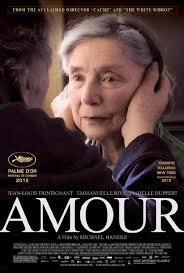Amour
(Directed by Michael Haneke)/2012
 Amour for
me isn’t about love, but our obsession with the concept of love that is to some
extent a social construct related to a state of beauty, peace, and happiness. The
film shows how this concept fails to work in the relationship between the dying one
and the carer when they are faced with the brutalities of the degradation of the human body.
Amour for
me isn’t about love, but our obsession with the concept of love that is to some
extent a social construct related to a state of beauty, peace, and happiness. The
film shows how this concept fails to work in the relationship between the dying one
and the carer when they are faced with the brutalities of the degradation of the human body.
George and Anne are a retired couple in their 80s. They live a relatively prosperous life after careers in classical music. The film opens with their outing one night to a concert and George tells Anne that she looks pretty. Anne is elegant and sophisticated: a delicate porcelain doll. George is in awe of her beauty even after all these years and is still deeply in love with her. The next morning, Anne fails to respond to anything for a few minutes; this is the beginning of the series of strokes that paralyses Anne bit by bit until she is rendered completely helpless like a new born baby.
 Amour for
me isn’t about love, but our obsession with the concept of love that is to some
extent a social construct related to a state of beauty, peace, and happiness. The
film shows how this concept fails to work in the relationship between the dying one
and the carer when they are faced with the brutalities of the degradation of the human body.
Amour for
me isn’t about love, but our obsession with the concept of love that is to some
extent a social construct related to a state of beauty, peace, and happiness. The
film shows how this concept fails to work in the relationship between the dying one
and the carer when they are faced with the brutalities of the degradation of the human body.George and Anne are a retired couple in their 80s. They live a relatively prosperous life after careers in classical music. The film opens with their outing one night to a concert and George tells Anne that she looks pretty. Anne is elegant and sophisticated: a delicate porcelain doll. George is in awe of her beauty even after all these years and is still deeply in love with her. The next morning, Anne fails to respond to anything for a few minutes; this is the beginning of the series of strokes that paralyses Anne bit by bit until she is rendered completely helpless like a new born baby.
Death is a delicate topic and there is a certain script one should follow: one must always be somber and sad and the dying person’s wishes come above everything else. There is a power that one gains by being the “dying one”: you can demand and be petulant and get away with it because the script allows you to behave in such way.
Initially the couple does not know how to deal with this distortion in the power dynamic of their relationship. Anne tries to carry on as if she is still the same but gradually comes to enjoy the privilege and patronises George who is consistently on eggshells and doesn’t know what to do.
At the same time the deteriorating condition of Anne and the care she requires in self-maintenance and grooming takes it's toll on George's idealisation of Anne, his lover. George is faced with some of the grotesque aspects of caring for a human body. Both George and Anne are embarrassed by what each other has to go through and George feels guilty for being repulsed by these duties. For Anne, her loss of cognition soon renders her unable to feel shame and embarrassment.
The couple’s only visitor is George and Anne’s daughter who comes from England every now and again for a visit. She finds it easy to follow the 'death script'; crying and being sad, but she does not have any insight into the practical, everyday difficulties George faces. As an occasional visitor, their daughter is shocked by her mother’s worsening condition and is critical of the whole situation without offering help. This leaves George to feel even more inadequate and lost. The film in some respects is critical of the nuclear family dynamic and lack of social support that is available. The couple hires a nurse who only fulfills her duties in professional capacity and the majority of the time George is left alone in the big apartment with Anne’s moaning and grunting haunting his consciousness.
In his state of complete loss of control, George is incapable of carrying on. He has one clear vision of what is most important to him: the love that him and Anne shared and his beautiful memory of Anne. He carries out his mission to protect just that and there is nothing more left for him.
This film for me ultimately poses questions about what our idea of love and death should be. In this film, both ideas seem so inflexible, they clash and create traumatic experiences. We place our love and death each on a pedestal that is incapable of absorbing any humane character. Should we be thinking about love and death differently or is the trauma worth going through because the inhumanity of the concepts is what makes them super and awe inspiring?